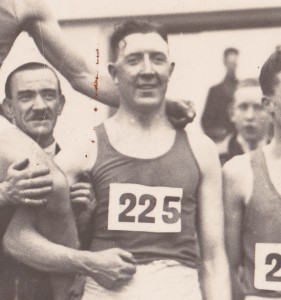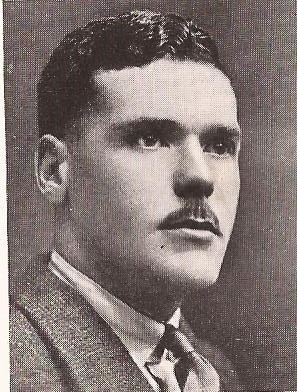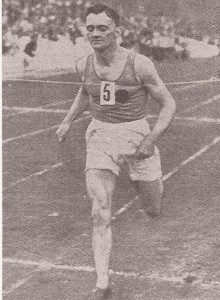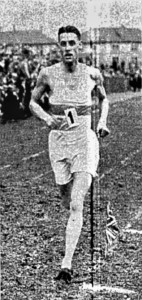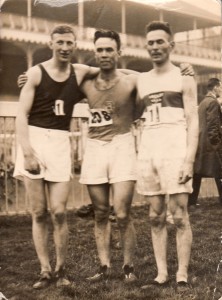Donald MacLean
The decade began with the club’s sports being held on June 9th, 1930. It was a typcially busy June Saturday’s athletics with meetings being held in Edinburgh, Shotts and Alloa in addition to the sports held by Catrine AAC, Singer’s Factory and Falkirk Scouts. There was also a whole range of Schools championships including Glasgow High, Hutcheson’s Grammar, Bellahouston Academy, Larchfield School, Hyndland Secondary, North Kelvinside, Jordanhill, Greenock Academy and Ardrossan Academy. And always on the first Saturday of June, there was the Scottish University Championships – held in 1930 in Edinburgh. They were all well supported and reported on in the pages of the ‘Glasgow Herald’ which said of the Queen’s Park FC Sports, held in front of a crowd of approximately 5000 spectators:
The outstandingt feature of an excellent Queen’s Park meeting was the much improved form shown by Donald MacLean the ex-Mile champion. Running in the two mile team race, he disposed of a field which included WJ Gunn, WH Calderwood and F Stevenson, in excellent style. The pace he set and maintained in the final lap was too much for even these experienced runners, and his winning time of 9 mins 30 3-5th secs was better than that of J Suttie Smith a week ago at Tynecastle, where MacLean only finished fifth, a long way behind the Dundonian. So it is evident that MacLean has found some running in the interval, and a continuance of that will bring him right into the picture at the Scottish championships.
The other two special events were not so satisfactory, as Duncan Wright had only local runners opposing him in the 13 mile road race, and, veteran though he is, he is still much too good for anyone in Scotland in an event of this kind. The absence of the students from the Edinburgh team robbed the intercity relay of much of its interest, Glasgow winning very easily. One would have liked, however, to have seen J Drummond, the Stewarts master, in better circumstances. His running in the quarter was promising in face of an impossible task.
James Crawford made a fleeting first appearance of the season, running only in the heats of the 100 yards. Here he was beaten out of a place behind two runners who dead-heated in 10 4-5th secs. and it was apparent that he was short of his best and had only turned out in loyalty to his club. Open sprints are very hot races this season , and in this particular one even time was recorded in five of the heats and also in the Final won by that sterling runner, AD Turner off 4 yards. Turner also qualified for the Final of the furlong but failed to get through to a place. In this event, W McLaughlin of Springburn ran a fine race, only being beaten off five yards in 22 3-5th sec. As at Maryhill’s meeting, the Mile was divided into two sections, a much more sensible fashion than asking back-markers to plough through a crowded field. SK Tombe of West of Scotland, who has been under something of a cloud this season, ran a well-judged race to win one of the heats in good time. The final of the half mile was an exciting one, JB Donaldson of Edinburgh Northern, defeating J McKell of Springburn, only after a struggle which lasted over the last 80 yards.”
The names mentioned were all very good one – Dunky Wright had won the British Empire Games in 1930, Walter Gunn, Walter Calderwood, Sammy Tombe and Donald Maclean were noted distance runners and Scottish internationalists too while Crawford and Donaldson were national sprint champions. Many of the Scottish football clubs had their own sports meetings – Rangers, Celtic, St Mirren and Queen’s Park were among those who held amateur meetings while Clyde FC’s Sports meeting was a professional one whch only became amateur after the 1939-45 War. The big names tended to head for Ibrox and Parkhead where the expenses were probably better but Queen’s Park had more than it’s share of international athletes competing.
Tom Riddell
There was no report at the end of May or start of June in 1931 of a club sports meeting – possibly because it was a Glasgow Civic Week Sports Day and many excellent events were organised in the course of the first week in June, but they were back in 1932. On 30th May, the ‘Glasgow Herald reported on the meeting under the headline “NEW SCOTTISH RECORDS AT HAMPDEN: RIDDELL AND SMITH RUN BRILLIANTLY ” 11 open events, six invitation events and a five-a-side tournament won 1-0 by Rangers over Third Lanark. Held in ‘showery’ weather and before another 5000 crowd, the track was reported as being fast – it could hardly be anything else with two Scottish records and other fast races on the programme. The report is accordingly a bit longer than the usual, and it reads:
“Although the rain made things somewhat disagreeable for the crowd at Queen’s Park FC meeting at Hampden on Saturday afternoon, it had little effect on the excellently prepared track, and when the blustery wind which blew at the commencement of proceedings died away the conditions were excellent for fast running and outstanding performances. Both were forthcoming, for not only was fast time recorded in the track events without exception, but two new Scottish native records were created.
The first of these fell to T Riddell, the Scottish mile champion who crossed from Belfast to run at the meeting. Runnin g from scratch in the three-quarter mile handicap, he cobered the distance in 3 min 6 1-5th sec, this being 3 4-5th sec faster than the previous record made by himself at the evening meeting of the Shettleston and West of Scotland clubs on the same track three years ago. Riddell ran a magnificent race, caught his men a furlong from home and went on to win by 15 yards. He finished so fresh that the impression was left that had he been pushed in the last quarter his time would have ben even better. He returned 59 sec in the first quarter, 63 sec in the second and 64 1-5th sec in the final lap. Riddell’s races have been comparatively few on the Scottish tracks in the past three seasons but on each occasion he has demonstrated the loss sustained by Scottish athletics when he took up permanent residence in Ireland.
The three mile scratch race was in some respects the best of the afternoon as it provided the man-to-man duel that is always acceptable to the people on the terracing. J Suttie Smith and JF Wood were the central figures and it was the rivalry between the pair that enabled Smith to slice 3 sec off the 14 min 44 1-5th recorded by Wood when running against Paavo Nurmi at the Rangers meeting last August. During the past two seasons Smith has been somewhat over shadowed but on this occasion he was at his very best, running with an easiness and poise and with a confidence that was impressive. He was content to let Wood do the pacing practically throughout the whole journey, but when the final lap was entered upon he was within strikingdistance, and getting on terms halfway down the back straight, passed Wood to win by a good 10 yards. Wood ran up to form. He equalled his own record time, but for the afternoon he had met his master. The revival shown by the Dundee man was a welcome one and a great race is promised when R Sutherland and Wood meet in the Scottish championships a month hence.
FP Reid took part in two races, the 120 yards and the intercity relay, and ran well in both. At the time the sprint was run off there was a troublesome head wind, and in the circumstances his time of 12 2-5th sec, altough slower than his two times at Ibrox last Monday evening was quite satisfactory. His victory however was a narrow one, DA Brownlee, the inter-scholastic champion, disputing the verdict right to the tape.
There was an interesting meeting in the second of the furlongs between Reid and AD Turner, the hope of the West. The Maryhill man has been laid off with an injured muscle, but seemed to run with all his old power. At the take-over Turner was about three yards ahead, but the chmpion was quicker into his stride and caught the Glasgow runner to hand over two yards in the lead. His good race was, however of no avail, as CD Hume proved no match for Ian Borland over the quarter on this slender lead. Borland ran an excellent quarter, probably as good as anything he has done in fully two years, and indeed the running all round in this race was distinctly above the ordinary, as the time 3 min 45 4-5th sec indicates. This is 1 1-5th inside the Scottish record, but being accompished by a composite team, will not rank. JP Laidlaw and J Hood had an interesting tussle over the half-mile section, and RHH Wallace of Stewart’s ran very well when opposed to PW Brown in the first of the furlongs.
The absence of WJ Gunn and M Rayne from the Plebeians team reduced the team race to a struggle between Maryhill and Shettleston, the former being declared winner by 21 points to 23. It transpired afterwards that some mistake had been made in Maryhill’s placings and their total should have been 16. The difference came through one man being omitted and it might have been serious if the first decision had been overturned.
In all the open events run on the cinders, the times returned were very fast. In the 220 yards 22 2-5 was recorded by the winner, in the 440 yards 50 2-5th, in the half-mile 1 min 57 1-5th, and in the two Miles (first and second class) 4 min 21 4-5th and 4 min 20 3-5th. The outstanding performance in this section was undoubtedly that of R Graham (Motherwell) who won thefirst class Mile of 25 yards. This marks him out as running inside 4 min 27 sec and that puts him right among the best in Scotland. Since coming into prominence in the closing meetings of last season he has made rapid progress. For a Youth his judgement in running is exceedingly good and his finishing shows perfect timing and stamina.”
The complete results are available in the Glasgow Herald and make for interesting reading – eg Rab Foreman from Edinburgh had the only double at the meeting and he went on to be President and Secretary of the SAAA and he was also team manager for the Empire Games team.
R Graham
On 29th May, 1933 there was another record at the Queen’s Park Sports as well as a major upset when Tom Riddell was beaten by Jackie Laidlaw over 1000 yards. Held in excellent conditions, the spectators again numbered about 5000. The record was for the three miles and was set by Tom Blakely of Maryhill Harriers. His time was 14:33 which was 5.2 secs faster than his own existing record, set at Parkhead a year earlier. It was also his second record of the week: he had set the two miles record six days earlier at 9:19.8. In comparison to Shrubb’s all-comers record, Blakely’s three miles was onl 5.8 seconds slower. It was quite exceptional running. Splits? First mile in 4:45, second in 4:57. Plebeian Harrierswon the team race.
Riddell was beaten by Jackie Laidlaw who was off 10 yards, but that made no difference as Laidlaw’s time was actually faster tan Riddells’ who was well beaten. It was Laidlaw’s third victory in ten days: he won two miles at Monkland Sports the previous Saturday, and then won a half mile at Maryhill on the Monday. Against that it was Riddell’s first race of the season. Most of the sprinters from the previous year were in action – Reid and Turner were specially mentioned and the 440 yards for the Eric Liddell Bowl was another great race won by E Davis – formerly Springburn but now running for Glasgow Police. Laidlaw ran the first (half mile) stage of the relay. Calderwood of Glasgow was only five yards down however and AD Turner, Robin Murdoch and Ian Borland saw the Glasgow team win.
It was a good afternoon with seven open events, six invitation events, one cycle race and a five-a-side tournament which Celtic won 1 – 0 over Partick Thistle.
Jackie Laidlaw
There were no results of any QPFC meetng in 1934, so the next one to look at is the one held on 1st June 1935. There were more consecutive reports of outstanding meetings held by Queen’s Park in the 1930’s than I can remember in any previous decade. This one began (and I only quote the first two paras):
“The principal open meeting on Saturday was that of Queen’s Park, and it is questionable whether during its long and honourable history our premier club has staged as satisfactory and afternoon’s sport. The class of competitor was the best that Scotland can produce, and if the conditions were not perfect – there was a strong breeze troubling the runners in the track events – the performances on the whole were of a distinctly good standard.”
There were four events chosen as of particular merit. The first of these was the inter-city relay which was won by Edinburgh. R Graham of Glasgow ‘won’ the first stage in 2 minutes but Turner and Murdoch lost a lot of ground over the two furlongs to Littlejohn and Blair. Wylde of Edinburgh had a good eight yards lead on Murray of Glasgow at the start of the final quarter and, although he eventually caught his man, he could not maintain his effort and the resulting Edinburgh win was regarded as a bit of an upset. Tom Riddell made his first appearance of the season in a ‘special mile’ invitation held ten years after hehad fought out a thrilling Mile against MacLean of Maryhill but this time, although he was running, MacLean was not able to figure in the race. Riddell had forecast lap times and managed to hit them – 62 sec, 2 min 6 2-5th, and 3 min 13 25th – and won in 4 min 18 sec. The third race highlighted was the 440 yards, won by Charlie Francis (the old Kelvinside Academy pupil) from CF Campbell of Springburn with back-marker Botha (scratch) third. In the three miles, the sub-headline read ‘Laidlaw Wins Again’ and that was the story. He defeated W Sutherland of Shettleston in 14 min 59 2-5th sec although Shettleston won the team race.
As for the other events, Edinburgh also won the half-mile relay and one of thes surprises of the meeting was the form of the Springburn athletes who won the 100 yards (A Campbell), 100 yards Youths (JJ Watters), 220 yards (A Campbell), Mile (A Montgomery) and had seconds in the half-mille (AE Nimmo) and high jump (EG Laird).
In the five-a-sides, Hamilton Academicals beat Rangers in the final by 2 goals to none. Yet again were the Sports held in fine weather and yet again the crowd numbered approx 5000.
The first Saturday in June in 1936 was the 6th, and there was good news and bad news for the club. First of all the meeting ‘was favoured with the presence of outstanding English athletes’ but on the other hand the spectators totalled only about 3500. The weather was dry but apparently not conducive to good times although W Roberts of Salford and Sweeney of Milocarians performed well. Bill Roberts was a top class 440 yards runner who ran at the 1936 Olympic Games in Berlin where he was fourth in the final of the 400m, and was a member of the gold medal winning 4 x 400m team. He also ran in the 1948 Olympics but did not progress beyond the heats. His best time in 1948 was 48 seconds but when he ran at Hampden in 1936 he had run 46.8 seconds. He won comfortably in 49 3-10th secs, despite having to run wide on the two bends, from eight of Scotland’s finest.
As for Sweeney, the report read: AW Sweeney, the English 100 yards and Empire sprint champion, ran in the heat and semi-final of the open 100 yards besides appearing in the 120 yards. Throughout he showed how superior he was to all on view. He won his 100 heat from scratch in 9 8-10th sec, but went out in the semi-final. The sprint, by the way, fell to JE Creegan, Uddingston, who conquered Sweeney in the cross tie and won the final in 9 6-10th sec from his mark of 6 yards – probably the fastest sprint ever run at Hampden.
Sweeney qualified easing up in the second heat of the 120 yards in 11 6-10th sec, equalling RE Walker’s South Africa all-comer’s record of 27 years ago. He just failed to hold RTE Littlejohn, Edinburgh Harriers, from four yards, in a tremendous finishing burst, also in the same time as his heat. Robert Graham, Maryhill Harriers, turned out in the special one mile handicap and disappointed by only reaching fourth place, finishing about 30 yards behind the winner, G Andrews, Plebeian, in 4 min 27 4-10th sec. Of course a strong breeze militated against fast times in this race. In the inter-city one mile race, Glasgow beat Edinburgh by six yards in the slow time of 3 min 46 2-10th sec.
Jack Gifford of Bellahouston won the three milesfrom JC Flockhart in a great race by three yards in the splendid time of 14 min 49 6-10th sec. There was another innovation for the club sports: a Scottish Women’s Select Team wonthe women’s 4 x 110 yards relay race. They returned the fast time of 52 8-10th to beat Bellahouston by ten yards.”
Tere were six invitation events and eight open events plus two cycle races and a five-a-side tournament with all six Glasgow clubs (Queen’s Park, Rangers, Celtic, Third Lanark, Clyde and Partick Thistle) competing.
Peter Allwell, Emmet Farrell and Alex Dow
1937 was the first time that John Emmet Farrell appeared on the programme at Hampden – he ran in the Three Miles individual and team race where he finished second behind Laidlaw and led the Maryhill squad to victory. No English runners this time, but there were lots of close finishes. The following race descriptions are from the ‘Glasgow Herald’ of 7th June, 1937.
“The three miles was a keen race and the lead fluctuated many times. First, JC Flockhart, the international cross-country champion, set the pace, and others took their turn leading the field, but the actual winner JP Laidlaw (Edinburgh Northern Harriers) waited until 60 yards from the tape and challenged JE Farrell (Maryhill Harriers). Runing on strongly, Laidlaw won with five yards to spare. He held the three miles championship two years ago but sustained a serious injury last season and could not defend his title which was won by Jack Gifford (Bellahouston Harriers) . Gifford never showed any signs of winning Saturday’s race and was a poor fourth although he will undoubtedly do better on championship day.
Result: 1. J Laidlaw; 2. JE Farrell; 3. WG Black (Plebeian Harriers). Winning Time: 14:56 2-10th. Team Race: 1. Maryhill 17 pts; 2. Plebeian 17 pts.
One Mile Inter-City Relay. Exceptionally fine form was shown by the competitors in the one mile invitation inter-city relay race between Glasgow and Edinburgh. Murdoch’s injury weakened the Glasgow team, and W Millar of Ayr, who also has a connection with Maryhill Harriers, had to take his place. Over the first part of the race, a half mile, Robert Graham, the Scottish mile champion and record holder, ran for Glasgow and his opponent, in the absence of JC Stothart, who was present but not fit enough to run, was Olaf Hoel, an upstanding Norwegian who is attached to Field Events Club. Hoel accepted the task of pace-making and made the speed comparatively slow, while Graham allowed him to keep in front until the last bend. It was there that Graham made his effort, but although he drew away momentarily, Hoel challenged powerfully, and the pair enjoyed a thrilling neck-and-neckl struggle up the back straight. Whatever small advantage the Glasgow runner had was destroyed when JD MacKenzie took the lead against W Millar at the change-over. MacKenzie ran out strongly, and passed the baton to J Wilkie five yards ahead.
DM Pearson, the Scottish champion, ran for Glasgow over the next furlong, but he made no impression on the Eastern man and WMO Rennie, the noted Glasgow University quarter mile champion, was fully five yards behind HG Giles when he started over the last lap. Rennie now challenged his rival, however, and although Giles tried to match his pace in the straight, Rennie wore him down easily to win by six yards.
The winning time was 3 min 39 1-10th sec.
There were only four invitation events in 1937 including a 4 x 110 women’s relay which was won by Bellahouston Harriers from Edinburgh University in 53 6-10th sec. The Eric Liddell Trophy was won by JC Carson (Springburn Harriers) in 49 8-10th seconds. He was off a mark of 22 yards.
There was no report of a meeting in 1938 – that was the year of the Empire Exhibition event and there were many events put on that summer. Many events were also cancelled for the festival and maybe the Queen’s Park Games was one of them: maybe it was moved to another date or even included in another meeting. Whatever the reason there was no Sports held by the club at the end of May or start of June that year. Withe the War starting the following year, that was also a blank as far the meeting was concerned.
